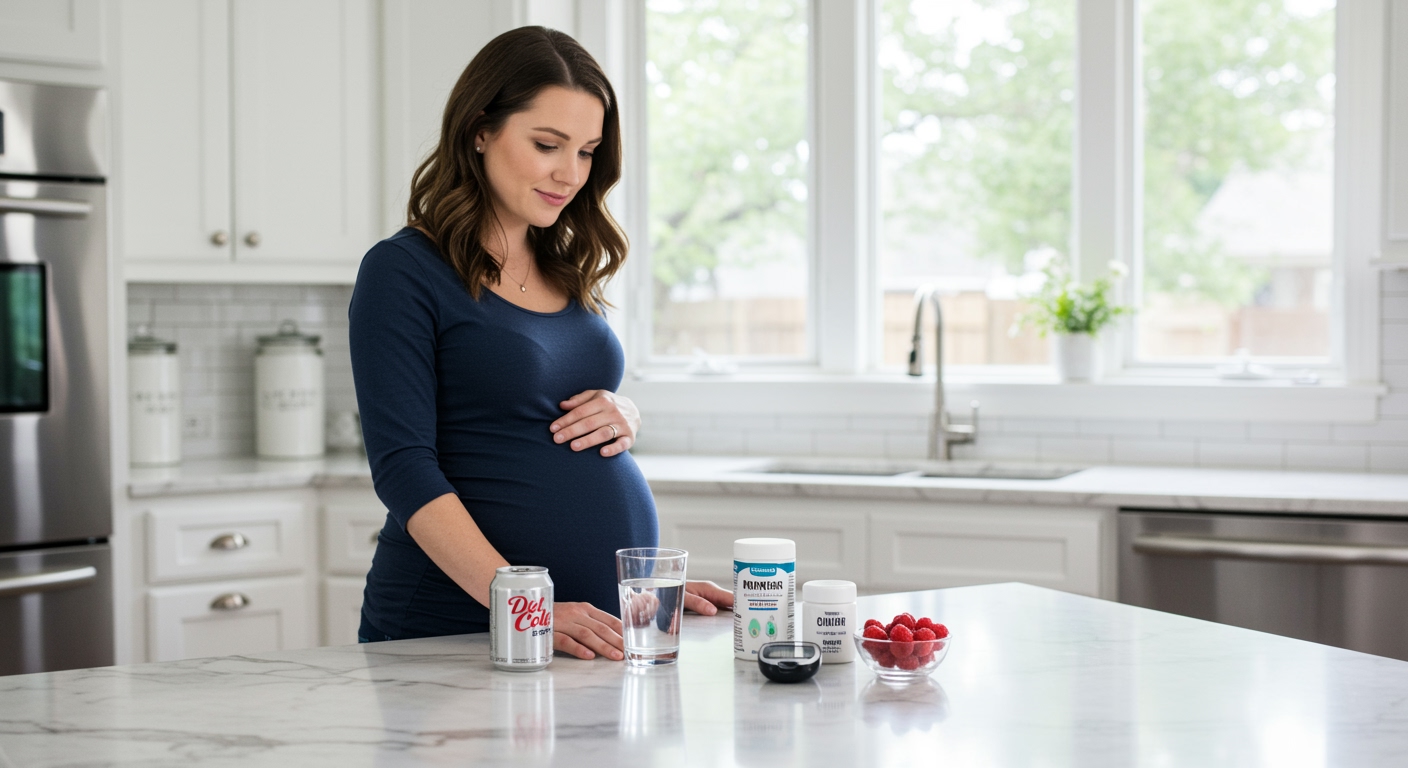✪ Key Highlight: Drinking five or more diet sodas weekly during pregnancy increases gestational diabetes risk by 88 percent.
Introduction
You reach for a diet soda thinking you are making a healthier choice during pregnancy.
New research from the University of Adelaide shows that artificially sweetened beverages during pregnancy can nearly double your risk of developing gestational diabetes.
Hi, I am Abdur, your nutrition coach and today I am going to analyze this groundbreaking study that challenges everything we thought we knew about diet drinks during pregnancy.
What Does This Study Actually Show?
Researchers analyzed data from more than 3,600 women who participated in the Australian Longitudinal Study on Women’s Health.
The study focused on beverages like diet cola, other diet carbonated drinks, and non-carbonated diet cordials, fruit, or sports drinks.
Women who consumed five or more artificially sweetened beverages per week had an adjusted relative risk of 1.88 for gestational diabetes.
This means their risk was nearly doubled compared to women who drank none.
For every additional artificially sweetened drink consumed, the likelihood of gestational diabetes rose by five percent.
The researchers used advanced statistical models to ensure reliability, adjusting for age, body mass index, family history of diabetes, and physical activity.
✪ Fact: Gestational diabetes affects about 14 percent of pregnant women worldwide.
Why Are Diet Drinks So Dangerous During Pregnancy?
Artificial sweeteners like aspartame, sucralose, and acesulfame potassium may disrupt your body’s glucose metabolism during pregnancy.
These chemicals can alter your gut microbiome, which plays a crucial role in blood sugar regulation.
During pregnancy, your body already experiences significant hormonal changes that affect insulin sensitivity.
Artificial sweeteners may interfere with these natural processes, making it harder for your body to manage blood sugar levels effectively.
Some studies suggest that artificial sweeteners can trigger insulin responses even without actual sugar intake.
This confuses your body’s natural regulatory systems and may contribute to insulin resistance over time.
✪ Pro Tip: Your taste buds can adapt to less sweet flavors within just two weeks of reducing artificial sweeteners.
What Exactly Is Gestational Diabetes?
Gestational diabetes is a type of diabetes that develops only during pregnancy and causes high blood sugar levels.
It occurs when your body cannot produce enough insulin to meet the increased demands of pregnancy.
This condition usually develops around the 24th to 28th week of pregnancy when hormonal changes make your cells more resistant to insulin.
While gestational diabetes typically goes away after delivery, it significantly increases your risk of developing type 2 diabetes later in life.
Women who had gestational diabetes have a 50 percent chance of developing type 2 diabetes within 10 years after pregnancy.
The condition can also cause serious complications for your baby, including macrosomia (excessive birth weight) and breathing problems at birth.
✪ Note: Gestational diabetes often has no obvious symptoms, making regular screening essential during pregnancy.
What Should Pregnant Women Drink Instead?
Water should be your primary beverage choice during pregnancy, aiming for 8-10 glasses daily.
Plain milk provides essential calcium and protein that support your baby’s bone development.
Fresh fruit juices in small amounts can satisfy sweet cravings while providing vitamins and minerals.
Herbal teas like ginger or peppermint can help with morning sickness while keeping you hydrated.
Coconut water offers natural electrolytes without artificial additives or excessive sugar.
If you crave carbonation, try sparkling water with a splash of fresh lemon or lime juice.
Homemade smoothies with whole fruits and vegetables provide nutrients while controlling sugar content.
✪ Pro Tip: Infuse water with cucumber, mint, or berries for natural flavor without artificial sweeteners.
How Can You Reduce Your Risk?
Start by reading ingredient labels carefully on all beverages and food products you consume.
Look for artificial sweeteners like aspartame, sucralose, acesulfame potassium, and saccharin in the ingredient list.
Gradually reduce your intake of diet drinks rather than stopping abruptly to avoid withdrawal symptoms like headaches.
Focus on maintaining a balanced diet with whole foods, lean proteins, and complex carbohydrates.
Regular physical activity, as approved by your healthcare provider, can improve insulin sensitivity naturally.
Monitor your weight gain during pregnancy according to your doctor’s recommendations to reduce diabetes risk.
Schedule regular prenatal checkups to catch any early signs of gestational diabetes through proper screening.
✪ Note: Even small changes in your daily habits can significantly impact your pregnancy health outcomes.
The Bottom Line
This research clearly shows that diet drinks are not the safe alternative we once believed them to be during pregnancy.
Your health is worth more than the convenience of grabbing a diet soda.
I would love to hear your thoughts on this study and any questions you might have about making healthier beverage choices during pregnancy in the comment section below.
References
At NutritionCrown, we use quality and credible sources to ensure our content is accurate and trustworthy. Below are the sources referenced in writing this article:
- University of Adelaide: Artificially sweetened beverage consumption lifts gestational diabetes risk
- PubMed: Gestational diabetes research study
- Mayo Clinic: Gestational diabetes symptoms and causes
- CDC: About gestational diabetes
- HSE Ireland: Gestational diabetes information





